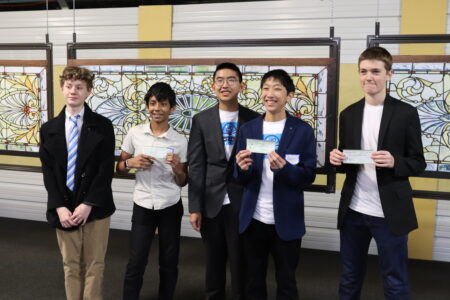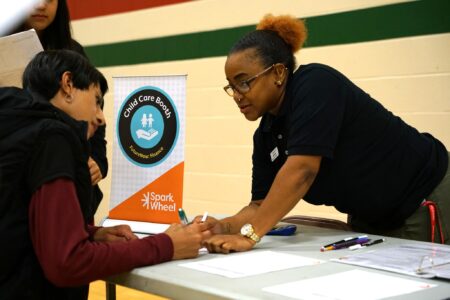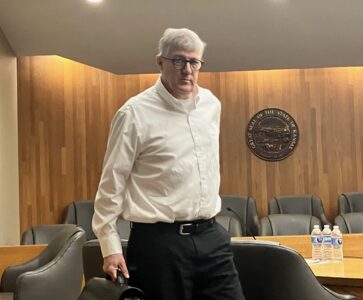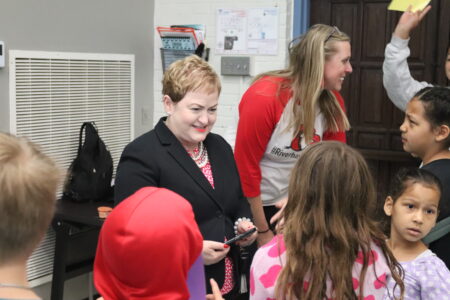Lawrence school board candidates share opinions on retaining quality staff, school safety, enrollment and more

photo by: Josie Heimsoth/Journal-World
The Lawrence school district offices building, located at 110 McDonald Dr., is pictured in May 2025.
Seven candidates are running for the Lawrence school board in the general election this November, and only three will be elected.
The Lawrence school board currently has seven members — President GR Gordon-Ross, Vice President Bob Byers, Kelly Jones, Carole Cadue-Blackwood, Anne Costello, Yolanda Franklin and Shannon Kimball. The three seats up for grabs in the upcoming election are Jones’, Byers’ and Kimball’s seats, and each incumbent is running to keep their seat.
The general election will take place on Nov. 4 with polling places open from 7 a.m. to 7 p.m. The last day for people to apply for an advance mail-in ballot is Oct. 28 and in-person advance voting ends at noon on Nov. 3. People can find their election day polling place on the Douglas County website.
The Journal-World asked each candidate for their stance on a variety of issues, including enrollment, equity initiatives and retaining high-quality educators. All seven school board candidates responded to the Journal-World’s inquiry.
The candidates’ responses are below. Plus, for more information, check out our article where we asked each candidate to get a little more philosophical with us by describing how they would apply the principles of the First Amendment to their duties.

photo by: Contributed
Bob Byers
Bob Byers
Byers has at least 40 years of experience in child welfare with the State of Kansas. He graduated from Pittsburg State University with a degree in social work in 1977, and he got his master’s degree in social work from the University of Kansas. While he is currently retired, Byers said he stays active in the community and serves on community boards.
Byers said in order to attract high-quality educators and support staff, he would explore and pursue opportunities to create more competitive compensation. He would also like to enhance employee benefit packages by advocating for continued full coverage of an employee’s health insurance.
To address bullying and staff misconduct, Byers said he would work to ensure the district has clear policies on bullying, harassment and staff misconduct and make sure they are consistently enforced throughout the district.
He said he would ensure that students have access to all educational resources that the district has available, like advanced coursework, enrichment programs and technology. Byers is also advocating for additional early childhood programs within neighborhood schools to jump-start kids’ education. He also said this would be a part of his strategy to draw families into the district to feed enrollment for years to come.
“Enrollment decline and financial stability remain the two foremost concerns of the district,” Byers said. “… With such a constricted budget, the district cannot achieve its equity goals which affects the district’s ability to make schools fairer and of higher quality which is imperative for stabilizing enrollment. Another issue is the district’s inability to compensate its teachers and support staff. All these issues are unavoidably linked, which makes it even more important to reimagine and redesign how the district operates in order to regain a healthy, robust, and stable USD 497.”
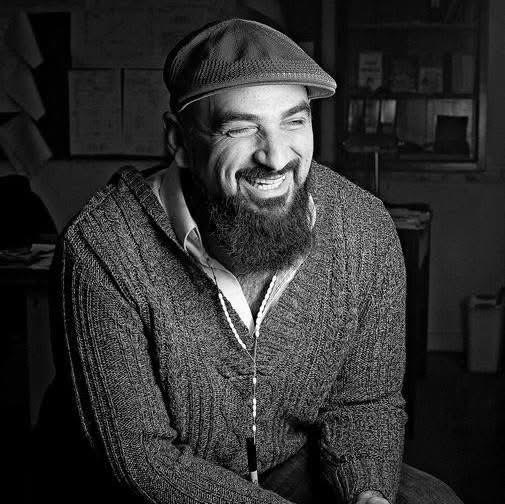
photo by: Contributed
ChrisTopher Niles Enneking
ChrisTopher Niles Enneking
Enneking is a co-founder of a sports-oriented tech company called StatsDraft and also works as a house cleaner for Sparkle Cleaning Services. In the past, he has worked at Lawrence Public Schools as a paraeducator and football coach. He received a degree in sociology from KU.
Enneking said it’s important to prioritize people over policies, so he’d make sure that the district is listening to teachers when they say what they need. He added that this goes for the parents too. He said he would like to provide child care at school board meetings and have meetings held at schools so that the district can hear from parents.
To bring more people to the Lawrence school district, Enneking said he’s exploring the idea of supporting economic growth by using public schools as community hubs — hosting events like small business expos, pop-up markets and networking sessions. That would bring the community into schools and highlights their central role, he said.
He said the best way to keep kids safe is to empower them to speak up. Whether it’s a threat, bullying, or a safety concern, he said that it’s often students who first see the warning signs, and that students who have the courage to report things that are wrong can sometimes save lives.
Enneking said that parents had lost trust in the district’s public schools, and that rebuilding that trust would take a lot of time. He said parents needed to see the district’s willingness to accept responsibility for problems and work together with the community to find solutions.

photo by: Contributed
Kelly Jones
Kelly Jones
Jones’ career has included work in domestic and sexual violence response, dementia care, alternative education, AmeriCorps programs and disability services. She currently works as an associate professor of practice and director of practicum education at KU’s School of Social Welfare. She has a bachelor’s degree in sociology and criminal justice from the University of Wisconsin and a master’s in social work from KU.
Over the next two years, Jones said, school districts need to focus on rebuilding trust, starting with educators and staff. She said retaining staff requires fair pay, manageable workloads, time for collaboration, a culture that values staff as professionals and more.
Jones said declining enrollment is a challenge facing districts across Kansas. In Lawrence, she said, it is likely because of declining birth rates, the lasting impacts of the COVID-19 pandemic and past school closures. However, she said the district can work to stabilize enrollment and strengthen schools with long-term, community-based solutions, like encouraging more affordable housing initiatives and working with the city and county to make those happen.
Jones was a co-author of the district’s equity policy and she said she will continue working on equity initiatives, including protecting students and staff who have migrated to the United States, “uplifting trans communities under attack,” and making sure that equity is reflected in budgets, staffing, curriculum, discipline and professional learning. She said the way to support safety is by ensuring well-staffed schools, adding that when high-quality educators are present, they build trusting relationships that prevent issues like bullying.
Jones said the most pressing challenges facing the district are keeping quality educators and ensuring stable funding for public education. She said that while progress has been made, teacher and staff pay still trails other nearby districts. Jones said meeting these needs requires fair funding, which is why she advocates for improvements to the Kansas school funding formula.

photo by: Contributed
Shannon Kimball
Shannon Kimball
Kimball has spent her career working in law and education policy. She currently works as a governmental relations specialist at the Kansas Association of School Boards, where she advocates for all Kansas public schools and helps train current and future school board leaders. Kimball earned her bachelor’s degrees in political science and Spanish from KU and a law degree from the University of Michigan Law School.
To retain high-quality teachers, Kimball said she has worked with board colleagues and district leaders to direct funding toward wage increases and support for classroom instruction. She added that she has supported improvements in professional development, leave policies and working conditions, and that she will continue listening to employees and investing in what helps them thrive.
Kimball was also a co-author of the district’s equity policy. She said she will continue supporting this work by advocating for the integration of research-based practices in schools, including targeted academic and behavior supports to ensure every student masters foundational skills. She also says strong family and community partnerships and culturally responsive teaching are important to promote engagement, belonging and achievement among students.
To improve communication and emergency response, Kimball said she has supported the adoption of a unified communications platform, ParentSquare; the Centegix Crisis Alert system, which allows staff to quickly notify administrators and first responders of emergency situations; and the Hall Pass visitor screening system, which checks all visitors against a national sex offender registry and issues secure ID badges to school visitors.
Kimball said improving student achievement and staff wages will take the most time and effort over the next few years because they are interconnected. The success of students, she said, depends on addressing the lasting effects of the COVID-19 pandemic, economic stressors and academic disparities, all while ensuring equitable access to high-quality instruction and support services.
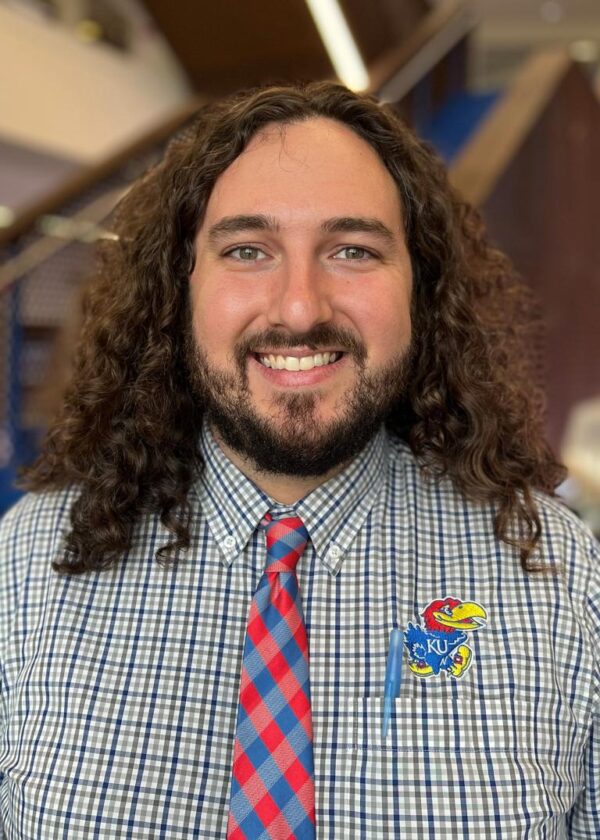
photo by: Contributed
Matt Lancaster
Matt Lancaster
Lancaster is currently a program director at the KU School of Business, where he runs a required undergraduate professional development program for all of the school’s roughly 3,000 students. He earned a bachelor’s in secondary education and a master’s degree in curriculum and instruction from KU. He also earned a master’s degree in educational leadership from Kansas State University.
He said he plans to work closely with the Lawrence Education Association union and with school staff to work for pay increases and to improve staff’s satisfaction and retention. Lancaster also said he would like to have conversations with people around the city to hear other voices in the community. There are also grassroots organizers who know more about local issues in schools, he said, and he would like to build relationships with them.
Lancaster said he would like to work with the city, county and state officials to make living in Lawrence more affordable and bring more people to the area. He added that people his age want to come to Lawrence to raise families, and that while it’s important to improve schools for those already here, the community also needs to address its housing and affordability crisis.
When it comes to safety for students and staff, he said the recent implementation of a tip line in the district has been a good first step. He added that students and families need to feel comfortable accessing the tip line for reporting staff misconduct, and the district needs to promote healthy conversations among all parties involved in a child’s education to stop problems before they can escalate.
Lancaster said that on the biggest issues facing the district, “I go back to staff recruitment, retention, and pay,” He said he thought that the district is far behind “in compensating what I would argue are our most important people appropriately,” and that this has to do with “degradation in the court of public opinion, and stagnation in recognizing teaching as a profession.”

photo by: Contributed
Pam Shaw
Pam Shaw
Shaw currently serves as an associate dean for medical education and a professor at the KU School of Medicine. Her career has focused on educational equity, mentoring future health care professionals and leading initiatives that improve outcomes for diverse communities. She graduated from KU with a bachelor’s degree in human biology, went to the KU School of Medicine for medical school and did her residency at KU as well.
To retain top talent, she said the district must invest in competitive compensation, robust professional development and a culture of respect and support. In addition, she said every student deserves access to educational opportunities regardless of background. Shaw added that equity audits and data transparency can help identify gaps, and partnering with families and community organizations can strengthen wraparound services.
Stabilizing enrollment requires a multi-pronged approach, Shaw said. She said investing in neighborhood schools, aligning programs with community needs and improving transportation access are important. She added that she supports strategic planning involving community input and considers housing trends, birth rates and family mobility.
She said student safety is foundational to learning and must be prioritized at every level. Shaw said she would move to strengthen policies through clear reporting procedures, trauma-informed practices and ongoing staff training. Bullying prevention must be proactive and misconduct must be addressed swiftly and transparently, she said.
Two pressing issues are the district’s budget sustainability and student and family retention in the district, which are related, Shaw said. She said ensuring a stable, equitable budget means making strategic decisions that prioritize student success and well-being. In addition, retaining families requires the district to build trust and offer high-quality educational experiences to create a sense of belonging for every student.

photo by: Contributed
Molly Starr
Molly Starr
Starr worked as a waitress, Alzheimer’s caregiver, in telecommunications, in graphics and copy editing and in health care architecture. She received her master’s degree in architecture from KU.
Starr said she would help retain high-quality educators and staff by encouraging livable wages, setting these as a priority before other costs in the district are decided. She added that she will make sure that teachers’ and education support professionals’ feedback is prioritized and addressed to help remove barriers.
Starr said she thinks students are most successful when they see themselves represented in the staff, so she would encourage seeking out better representation in school staff. She said she is also interested in exploring how the district can include first-person perspectives in Native American history curriculum by creating a working partnership with Haskell Indian Nations University’s students and staff.
To ensure student safety, Starr said, you have to focus on the staff members who are with the students every day. She said making sure there are strong policies protecting whistleblowing, explicitly stated sexual assault policies throughout the district and livable wages would make staff less fearful of repercussions for speaking out.
There is a disconnect between the district and the community after school closures, Starr said. She added that the community needs to work together and depend on one another to defend public education. She said she would like to see the return of Educate Lawrence, a meeting for working on mutual legislative goals, as well as the Beyond the Board, where community members can speak to board members to discuss upcoming issues in a less formal setting.


